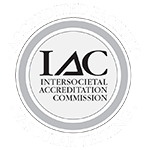
As travel season kicks into high gear, our doctors at The Cardiovascular Care Group often receive questions about Deep Vein Thrombosis (DVT). This condition, which involves the formation of a blood clot in a deep vein, usually in the legs, can be serious if not promptly diagnosed and treated.
Let's explore how you can identify if you might have a DVT, focusing on the symptoms and risk factors.
Recognizing the Symptoms of DVT
Being aware of the symptoms of DVT is crucial for early diagnosis and effective treatment. Here are some key signs to watch out for:
- Swelling: Sudden swelling in one leg is a common indicator of DVT. The swelling may occur without any obvious injury or cause.
- Pain: Pain or tenderness in the leg, which might start in the calf and feel like cramping or soreness, is another common symptom. This pain may intensify when you walk or stand.
- Redness or Discoloration: The skin on the affected area might become red or show a bluish hue. This discoloration can also be accompanied by warmth over the area of the clot.
- Warmth: The skin around the clot may feel warmer than other parts of your body.
Understanding the Risk Factors
Certain factors can increase your risk of developing DVT, especially during travel. Knowing these can help you take preventive measures:
- Prolonged Immobility: Long periods of sitting, such as during flights or car rides, can slow blood flow in the legs, leading to clot formation.
- Surgery or Injury: Recent surgery, particularly on the legs, hips, or abdomen, or a significant injury, can increase your risk.
- Medical Conditions: Conditions such as cancer, heart disease, and inflammatory bowel disease can elevate the risk of DVT.
- Family History: If you have a family history of DVT or blood clotting disorders, your risk is higher.
- Hormone Therapy or Birth Control Pills: These can increase the likelihood of clot formation, particularly if combined with smoking.
- Pregnancy: The increased pressure on veins in the pelvis and legs during pregnancy can lead to DVT.
- Age and Obesity: Being over the age of 60 or carrying excess weight can increase your risk.
When to Seek Medical Attention
If you notice any of the symptoms mentioned above, especially during or after travel, it is essential to seek medical attention immediately. DVT can lead to serious complications, such as a pulmonary embolism (PE), where the clot travels to the lungs, potentially causing life-threatening issues.
Prevention Tips for Travelers
To minimize your risk of developing DVT while traveling, consider the following tips:
- Move Around: Take breaks to walk around during long trips. If you're on a plane, try to move every hour or two.
- Stay Hydrated: Drink plenty of water and avoid alcohol and caffeine, which can lead to dehydration and increase the risk of clotting.
- Wear Compression Stockings: These can help improve blood flow in your legs and reduce the risk of clots.
- Exercise Your Legs: Simple leg exercises, such as ankle circles and foot pumps, can help keep blood flowing.
At The Cardiovascular Care Group, our specialists are dedicated to helping you stay healthy and informed. If you have any concerns or need more information about DVT, please don't hesitate to contact us. Safe travels!








_2.jpg)